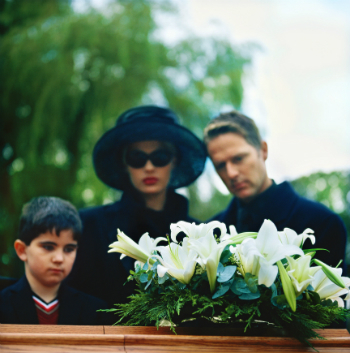I’m Paid To Mourn At Funerals (And It’s A Growing Industry)
[Original Article By: Cracked.com]
A lot of you reading this are not going to believe this job is a real thing. But professional mourners — people paid to attend funerals and pretend to be friends and family of the deceased — are not only real, but common. Or they are in places like China; it’s only just now starting to take off in Western countries. And we don’t mean that they kind of stand by the graveside to fill out the crowd — they assume fake identities and fool the rest of the mourners into thinking they’re one of the bereaved.
We spoke with Owen Vaughan, a professional mourner in London, to find out what it’s like to have a job that honestly seems too ridiculous to be true. He says…
People like me get hired to play the part of mourners at funerals and wakes for any number of reasons. Maybe the family is worried about embarrassingly low attendance, or they want to make their deceased parent seem more important (or at least, popular). The only thing sadder than a funeral is a funeral that nobody shows up to, so the decision is generally coming from a good place.
Still, I am an actor playing a part. My job is to suspend the disbelief of the other people in the room. And because so many different kinds of people die (all of them, in fact), I need to take on a number of different characters. That’s where it gets tricky. My background story needs to be effective and convincing, while simultaneously including valid reasons I would never have seen anybody at this funeral before. The family is often very helpful with this, but I have to do a lot of the study on my own. One time, I needed to learn some archery, because I was supposed to arrive as a deceased archery teacher’s former protege, and there was a chance I’d actually have to fire off arrows.
Remember, socializing is a key part of mourning. We have to mingle with the crowd and play the part; that’s why we’re there. Most actors don’t have a lot of experience interacting with their audience and improvising in character. Still, if you do enough character study, you end up knowing more about the deceased than some people who were truly close to them. I once sat next to an acquaintance of the deceased, in character as a former co-worker. I brought up a couple of funny stories and somehow slipped the deceased’s middle name. This guy had known him pretty well, but had no clue what his middle name was.
And if that alone doesn’t make it sound like a Daniel-Day-Lewis-level acting job, there’s the part where we have to pretend to be emotionally devastated …
Naturally, since I don’t know the deceased, it can be hard to work up too many tears about them. Some professional mourners I know can cry on cue like a toddler at Toys “R” Us, but most of us keep a supply of tools to help us jerk out some tears on command. For example, if we know the person’s occupation, we try to find the saddest or most depressing movie involving that profession and use that as a baseline.
Or I’ll think about my own dad or my grandparents passing away to get the tears started or to help hit the tone of voice that only comes from a genuine loss. My go-to is rewatchingSchindler’s List beforehand. Remembering Liam Neeson’s speech at the end is enough to get me going on a moment’s notice. If I ever reach the point where I can’t get emotional at the rescue of over a thousand Jews from Hitler’s grasp, that’s probably the point where I’ll need a therapist.
Female mourners I know will often use Titanic. A few of the women I know track their menstrual cycles to know how much effort they’re going to have to put into a good cry. Don’t get me wrong — us guys can still get their cry on. It’s just that it’s already harder for us as men because we’re psychologically conditioned not to. Thanks, societal gender norms.
4) Real Mourners Do Get Suspicious
I fully understand that getting paid to attend the funeral of a total stranger sounds like the plot of a forgettable Seinfeld episode. Yes, explaining this to people upsets them a lot of the time, and I can understand that. If you’re not familiar with the practice, the whole thing sounds creepy and off-putting. If we get caught by the friends and family at the service, things can turn awkward fast.
Usually, it’s the spouse or a child of the deceased who hired a bunch of strangers to come to the funeral, so they’ve got to be on patrol to back us up. (“You don’t remember dad’s crazy cousin Gunther? They used to be inseparable! Stop being so suspicious, Mom! Please?”) I’ve only been caught once, but I was lucky. When I was confronted and forced to confess why I was there, their response was simply, “Aunt Eugenie would do something like this.”




